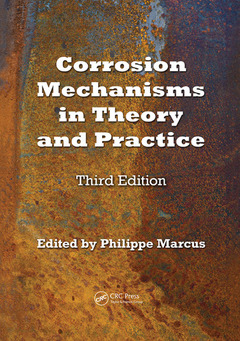Corrosion Mechanisms in Theory and Practice (3rd Ed.) Corrosion Technology Series
Coordonnateur : Marcus Philippe

Updated to include recent results from intensive worldwide research efforts in materials science, surface science, and corrosion science, Corrosion Mechanisms in Theory and Practice, Third Edition explores the latest advances in corrosion and protection mechanisms. It presents a detailed account of the chemical and electrochemical surface reactions that govern corrosion as well as the link between microscopic forces and macroscopic behavior.
Revised and expanded, this edition includes four new chapters on corrosion fundamentals, the passivity of metals, high temperature corrosion, and the corrosion of aluminum alloys. The first half of the book covers basic aspects of corrosion, such as entry of hydrogen into metals, anodic dissolution, localized corrosion, stress corrosion cracking, and corrosion fatigue. Connecting the theoretical aspects of corrosion mechanisms to practical applications in industry, the second half of the text discusses corrosion inhibition, atmospheric corrosion, microbially induced corrosion, corrosion in nuclear systems, corrosion of microelectronic and magnetic data-storage devices, and organic coatings.
With contributions from leading academic and industrial researchers, this bestselling book continues to provide a thorough understanding of corrosion mechanisms?helping you solve existing corrosion challenges and prevent future problems.
Fundamentals of Corrosion (Surface Science and Electrochemical Basis. Surface Effects on Hydrogen Entry into Metals. Anodic Dissolution. Thin Oxide Film Formation on Metals. Passivity of Metals. Passivity of Austenitic Stainless Steels. Mechanisms of Pitting Corrosion. Sulfur-Assisted Corrosion Mechanisms and the Role of Alloyed Elements. Further Insights on the Pitting Corrosion of Stainless Steels. Crevice Corrosion of Metallic Materials. Stress-Corrosion Cracking Mechanisms. Corrosion Fatigue Mechanisms in Metallic Materials. High Temperature Corrosion. Corrosion Prevention by Adsorbed Organic Monolayers and Ultrathin Plasma Polymer Films. Atmospheric Corrosion. Corrosion of Aluminum Alloys. Microbially Influenced Corrosion. Corrosion in Nuclear Systems: Environmentally Assisted Cracking in Light Water Reactors. Corrosion of Microelectronic and Magnetic Data-Storage Devices. Organic Coatings. Index.
Philippe Marcus is director of research at CNRS and director of the Laboratory of Physical Chemistry of Surfaces at Chimie ParisTech. Dr. Marcus has authored or coauthored over 300 papers and has received numerous awards, including the Uhlig Award from the Electrochemical Society, the Whitney Award from NACE International, the Cavallaro Medal from the European Federation of Corrosion, and the U.R. Evans Award from the Institute of Corrosion. His research interests encompass surface chemistry, surface electrochemistry, and corrosion science, with an emphasis on understanding the structure and properties of metal and alloy surfaces.
Date de parution : 05-2017
17.8x25.4 cm
Date de parution : 09-2011
Ouvrage de 929 p.
17.8x25.4 cm
Thèmes de Corrosion Mechanisms in Theory and Practice :
Mots-clés :
Anodic Dissolution; Potential Drop; pitting; Crack Tip; product; FeCr Alloys; crevice; Corrosion Products; cathodic; Potential pH Diagrams; reaction; Oxide Electrolyte Interface; stainless; Current Density; steel; Passive Layer; grain; Pit Nucleation; boundaries; Austenitic Stainless Steels; metal; Pitting Potential; zF Rt; Cathodic Delamination; Fe Cr Alloys; SCC; Space Charge Layer; Polarization Curve; Ohmic Drop; Pit Growth; LME; Crack Initiation; Coordination Shells; Redox System; Electrode Potential



